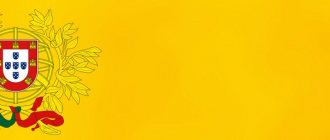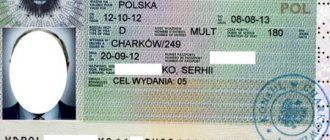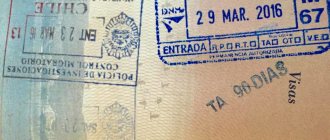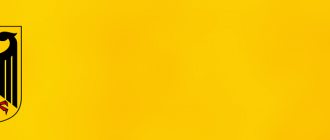The basis for foreign students to enter the Russian Federation is a study visa, but citizens of Ukraine, Belarus or Kazakhstan planning to enroll in Russian universities do not need one. Understanding visa issues is the task of every foreigner who wants to acquire a profession or improve the level of their qualifications in Russian educational institutions. In what cases is a Russian study visa required for foreigners, where and how to apply for it, we find out in this material.
When is a visa needed?
A visa document and a foreign passport are the main documents for entry into Russia for citizens of most countries of the world who plan to receive education.
Citizens from the CIS countries enjoy some advantages in this regard:
- Azerbaijan,
- Abkhazia,
- South Ossetia,
- Belarus,
- Kazakhstan,
- Kyrgyzstan,
- Moldova,
- Tajikistan,
- Ukraine,
- Armenia,
- Uzbekistan.
Applicants from these countries can come to Russia without a visa, and Ukrainians, Belarusians, Kazakhs, Armenians and Kyrgyzstans do not even need to obtain a foreign passport, because they will be allowed through at the border with a regular one.
You can stay in the Russian Federation under such (visa-free) conditions for only 90 days and after this period you must go home; This option is suitable, for example, for passing entrance tests at universities or for short-term training (for example, taking professional or language courses). For those who entered an educational institution for 4 years (under a bachelor's program), a visa is still required.
By the way, you can come to a Russian university to take exams, for example, on a tourist visa.
Programs for students
Domestic assistance
The Russian Government's Global Education program provides for the payment of financial assistance to students who independently enroll in foreign higher education institutions. It provides compensation for tuition, accommodation, travel, medical insurance, and educational materials.
To receive such assistance you must:
- provide a letter from the university about enrollment;
- so that your educational institution (225 universities) is included in the list of this program.
In return, a graduate of a foreign university must work for 3 years at a Russian enterprise.
Foreign funding
There is a list of grants that the EU and the USA provide for foreigners.
Grants can be provided by states, universities, philanthropists, and private foundations.
In return for university funding, you will need to teach some classes, check assignments, and participate in research. And if you are a successful athlete, then you can glorify the university with your achievements in sports.
One of the popular grandees is Erasmus Mundus. He pays for the entire master's degree and housing. The disadvantage is that only a few universities participate in the program, and it is not you, but the coordinator who chooses one of them.
The same can be said about Chevening in the British Kingdom. In addition, this grandee also pays for flights and meals for the period of study.
In the United States, there are student exchange programs (one-year study): for schoolchildren - FLEX and for students - UGRAD.
There are well-known foundations: Bill and Melinda Gates, Google, Anita Borg.
Such programs are constantly being improved. Therefore, when you are preparing to go to study, go to the government website of the selected country and take the time to get acquainted with the latest information. This activity could pay off for you in the future. And also get information from the foreign department of your domestic university: which universities are partners.
In the United States, half of our students study for free.
In Canada, most grants are in French.
Invitation as a basis for issuing a visa
The authorities that issue permits for crossing the Russian border put forward some mandatory conditions for obtaining a student visa. The main requirement for its issuance is the presence of an invitation from the receiving party.
If a foreigner enters on a general basis and personally applies to the admissions committee, the universities issue an invitation (transferred through the Ministry of Foreign Affairs of the Russian Federation). If an applicant applies for a state scholarship (enters under a quota), then the Ministry of Foreign Affairs itself deals with the preparation of invitation documents and passes them on to the future student through the representative offices of Rossotrudnichestvo.
What do you need to get an invitation?
To receive an invitation from a university or the Ministry of Foreign Affairs of the Russian Federation, you must:
- choose an educational institution and study program, find out about financing and admission options;
- send the documents that are required. If admission is based on a quota, documents are submitted to Rossotrudnichestvo; if on a general basis, then directly to the university;
- pass entrance examinations in your home country (if you are applying under a quota);
- wait for the invitation and go with it to get a visa (either to take entrance tests, or for direct study).
The approximate period for issuing an invitation document is 45 days. Validity period is 3 months, during which it is necessary to resolve the issue of further stay in the Russian Federation: either sign a contract with the university and register, or return home (if the applicant is not accepted).

List of documents for a student visa to Russia
What else is important to know
Foreign applicants intending to study in the Russian Federation should remember the following rules:
- Suitability for training in terms of health status is confirmed by a medical certificate.
- It is necessary to show the availability of funds sufficient to pay for studies, dormitory, and food.
- You definitely need to insure your life and health - you can order medical insurance from us.
- You cannot delay registering with the migration service - this is done immediately after arriving in the country.
Nuances of the student visa process
Obtaining a student visa to Russia for foreigners is quite simple if you take this issue seriously and take care of everything in advance. If we are talking about the desire to enter a university, it is advisable that at the time of receiving the certificate the former student already has a passport and medical certificates in hand. If a foreign citizen goes to courses or short-term training programs, special attention should be paid to the invitation as a basis for obtaining a visa document.
Package of documents
The list of documents for obtaining a study visa may vary depending on the conditions of admission, the age of the applicant and his country of residence.
It is imperative to prepare:
- application (in form) - filled out electronically, a handwritten version is also allowed;
- international passport – its validity should not expire earlier than one and a half years from the date of visa issuance;
- certificate of secondary education;
- an invitation from a Russian educational institution (original) - it must contain information about the university itself, the program and terms of study;
- photo (3 pcs.);
- medical certificate (for EU citizens);
- an insurance policy whose validity period is not less than the duration of the visa. It is important to take out insurance only from those companies that are partners of Russian insurance organizations;
- certificate of absence of HIV (valid only for 3 months), if the visa is issued for more than 90 days;
- bank statement confirming the opening of an account (for tuition fees). A must for those crossing the border for the first time;
- a copy of the document confirming payment of the consular fee.

When to serve
The prepared package of documents can be submitted to government authorities 45 days before the expected date of departure.
When re-issuing a visa, it is recommended to contact the relevant institutions 30-40 days before the expiration date of the current document.
Where to submit
Russian diplomatic missions (embassies or consulates) in the home country of the future student are responsible for issuing a study visa. In Austria, Bulgaria, Sweden, Greece, for example, you can obtain such a document at special visa centers. For an additional fee, these organizations can also issue an invitation and solve housing and other everyday problems.
Visa documents must be submitted in person or through a representative (by power of attorney).
What is a student visa and what are its features?
Important! Please keep in mind that:
- Each case is unique and individual.
- A thorough study of the issue does not always guarantee a positive outcome. It depends on many factors.
To get the most detailed advice on your issue, you just need to choose any of the options offered:
- Use the online chat in the lower corner of the screen.
- Call: Federal number: +7 (800) 511-86-74
A student visa is a mark in a foreign passport, which by its presence confirms the applicant’s ability to study on the territory of a foreign state in a specific educational institution.
Getting it is not so easy - the applicant must meet a number of requirements. One of the main features is the need to obtain an invitation from a foreign organization to undergo training under an accredited program.
Price and period for obtaining a visa document
Two to three weeks is the period during which a student visa is generally issued (from the date of application). When applying to visa centers, if, for example, a citizen has money but does not have time, the document will be ready in two days.
Additionally, in some cases, the length of the visa process depends on the migrant's home country. For example, Russia has signed an agreement with the European Union on visa simplification, according to which short-term entry documents are issued within a week, and free of charge. There is also an urgent procedure for issuing a visa if the invitation is issued by a diplomatic mission (and not by a university).
The cost of a Russian visa depends on the country of entry, the urgency of processing the document, and its frequency. Typically, the consular fee for paperwork varies between 35-70 euros. You can find out the exact amount of the payment at Russian diplomatic missions abroad and directly at visa centers.
Student Permit
To continue your education in other countries after graduating from school or a domestic university, you need to apply for a student visa abroad.
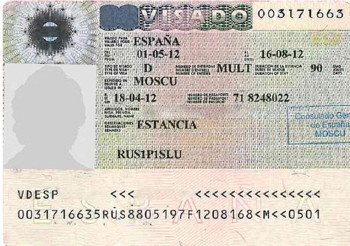
It is also issued for training courses in schools.
To plan to study abroad you need to have:
- High level of English (sometimes only the language of the country of study is required).
- Good grades in your certificate or diploma.
- Sufficient financial security.
Differences between a student visa and others:
- long stay with subsequent extension for the entire period of study;
- no need to pay a visa fee;
- gives permission to work (a certain number of hours).
Advantages:
- after graduation you may be given the right to work (for 12 months);
- cheap travel pass;
- subscriptions with a discount (50% or more) for cultural events, language courses, gyms, seminars;
- student health insurance;
- deferment from the army.
Validity period of a study visa
When applying for a study visa for the first time, its validity period is 3 months. For further legal stay in the Russian Federation, the document must be extended, and it is not at all necessary to return to your homeland; it is enough to contact the department of the Main Department of Migration Affairs of the Ministry of Internal Affairs at the place of registration. This issue is often dealt with by university departments for working with foreign students.
The basis for extending a visa are documents confirming the fact of study (certificate of study, signed agreement, receipt of advance payment, etc.); the visa document can be reissued for a maximum of one year.
After this period, you will have to deal with this issue again, and so on until graduation.
A study visa allows you to stay in Russia, move around its territory and cross the border.
What do you need to extend your student visa?
A timely extension of a study visa is possible by contacting the relevant authorities in advance: the collected package of papers must be submitted a month and a half before the expiration date of the current document.
The following must be attached to the application form and photographs:
- foreign passport (be sure to check the validity period);
- a copy of the agreement with the educational institution (or other document confirming the student’s status);
- application from the university (it must justify the reasons for extending the visa);
- a copy of the receipt for payment of the state duty (the amount of the fee in 2021, as in 2017, is 1,600 rubles);
- migration card and tear-off arrival notification coupon.
In addition, it is worth thinking in advance about how to renew the registration of a foreign student.
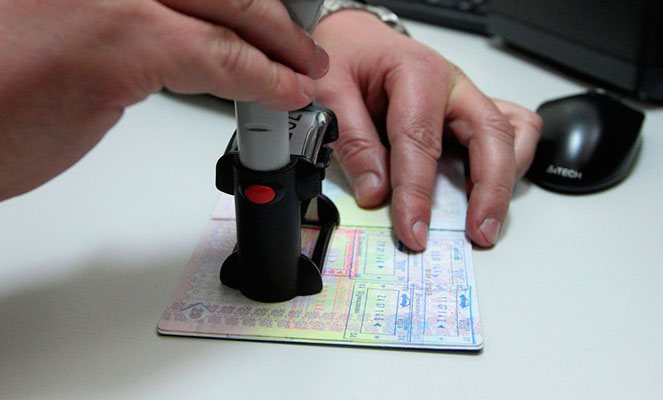
If you do not renew your student visa: consequences
The annual process of renewing a study visa is quite labor-intensive and requires time and effort. However, if you do not do this, the foreigner risks becoming an illegal immigrant in the Russian Federation with all the ensuing consequences.
We have previously written about who illegal immigrants are.
If a foreign citizen is on the territory of the Russian Federation with an expired visa, the following sanctions may be applied to him:
- fine - depending on the length of the “delay”, its size ranges from 2 to 5 thousand rubles;
- deportation is forced removal from the state.
- An entry ban is a temporary measure, the duration of which varies from several months to 5 years.
Our website provides more detailed material about what deportation is.
To avoid these and other problems, you need to deal with issues of re-issuing visa documents on time.
Requirements for a study visa
The most popular universities for choosing among Russians are: USA, France, Great Britain, Germany, Poland, Australia, Canada.
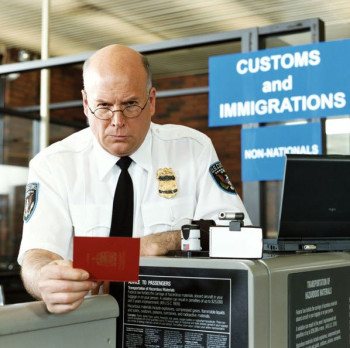
For many countries, the permitting age ranges from 15 to 65 years (UK - a minor student visa is issued from 4 years of age).
In the Schengen countries, the consular fee is 35 €, but students going to study are exempt from it. You will only pay if you use the services of specialized organizations.
Schengen countries
Types of study visas abroad:
- short-term (category C) – maximum 90 days;
- long-term (category D) – up to 6 months.
Category C is suitable if you are planning to undergo any short-term training, courses, or if you have just applied for admission to a university.
Category D must be applied for when you are accepted for study for a long period of time.
Subsequently, the validity of the study visa is extended for a year or more until you graduate from university.
Germany
To enter a university, you need to pass the matriculation exam according to the German program. And this is possible after completing the Hochschulzugangsberechtigung courses (2 years or more).

Holland
Permission is given for the entire period of study.
Great Britain
This country considers a number of types of student visas abroad:
- For an adult student;
- For a minor student;
- Student guest room;
- Entrant;
- Guest children's room.
A popular visa abroad is for an adult student. It requires you to score 40 points:
- 30 points are gained in the preparatory course of study at the selected university. After this, the educational institution sends an invitation letter to obtain a visa.
- 10 points characterizes the student’s financial side, which he must document.
Other countries
USA
The foreign student visa is called F-1. It is non-immigration and is issued under the student exchange program for up to 3 years.
To obtain it, you must document the fact of your successful studies in your home country, as well as pass the TOEFL (English language level) tests.
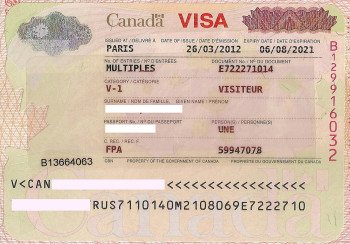
This type of study abroad visa is also suitable for academic studies. If the training is not in your specialty, then a category M permit is issued for up to 1 year.
Category J is required for the Work and Travel program.
If you want to take courses (up to 18 hours per week), a B-2 visitor visa is sufficient.
Canada
In this country, you need to get two visas to study: a student visa and a temporary resident visa.
And for this they require a letter from the university about enrollment. The university will accept you if you provide transcripts with positive grades from school and pass language exams.
Australia
Visa categories: 570 – English-language courses; 571 – school; 572 – universities; 573 – master's degree.
When they may not give a visa
Unfortunately, diplomatic missions may refuse to issue a study visa to a future student.
Refusal to issue a visa is possible on the following grounds:
- incorrect filling out of the form or incorrect execution of other documents (for example, if the insurance policy was obtained from a company that does not have an agreement with Russian partners);
- incomplete package of documents;
- doubts about the authenticity of documents or the actual purpose of the trip;
- previous negative experience in the Russian Federation (if there were violations of laws and similar incidents);
- current ban on entry into Russia.
In this case, representatives of the consulate (embassy) have the right not to explain the reasons for the refusal.
Study visa as a prospect
A study visa for a foreigner is an opportunity to receive a quality education, improve one’s skills, and become familiar with new knowledge, traditions, and culture. Despite the apparent complexity of completing this document, a firm intention to study in Russia and adherence to a clear algorithm of actions will help you receive the coveted invitation from the university, and after it, a visa. You can obtain the most up-to-date information, as well as advice on possible options to simplify the process, at the diplomatic missions of the Russian Federation and visa centers.



